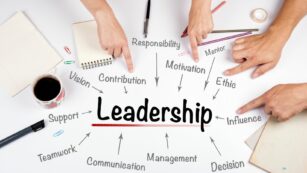In today’s rapidly evolving world, personal leadership has become a cornerstone for success in both professional and personal spheres. Crafting a personal leadership development plan is not just about climbing the corporate ladder; it’s about cultivating a deep understanding of one’s strengths, weaknesses, and potential. This strategic blueprint can guide individuals through the complexities of their careers and personal lives, fostering growth and effectiveness.
Personal Leadership Development Plan
The Personal Leadership Development Plan serves as a crucial blueprint for individual growth, strategically aligning personal ambitions with professional milestones. It acts as a roadmap, guiding individuals through the evolving landscape of their careers by leveraging personal strengths and addressing areas for improvement.
Importance of Personal Leadership in Professional Growth
 Personal leadership plays a pivotal role in professional advancement. It fosters self-awareness that helps individuals identify their unique competencies and areas where they can improve. Recognizing one’s strengths, for example, leadership skills or technical expertise, enables tailored career development strategies, maximizing professional effectiveness and opportunities for promotion.
Personal leadership plays a pivotal role in professional advancement. It fosters self-awareness that helps individuals identify their unique competencies and areas where they can improve. Recognizing one’s strengths, for example, leadership skills or technical expertise, enables tailored career development strategies, maximizing professional effectiveness and opportunities for promotion.
Moreover, personal leadership encourages proactive problem-solving. When challenges arise, individuals equipped with a robust leadership plan can navigate obstacles more effectively, demonstrating resilience and adaptability—qualities highly valued in any professional setting. This proactive approach not only enhances individual performance but also contributes significantly to the success of their teams and organizations.
In addition, mastering personal leadership aids in setting clear career goals. It provides a framework for continuous personal and professional development, ensuring that individuals do not become stagnant.
Key Components of a Personal Leadership Development Strategy
A Personal Leadership Development Plan is essential for aligning personal growth with professional objectives. This section explores the core components that are integral to crafting an effective leadership strategy.
Assessing Your Current Leadership Skills
 Identifying existing leadership skills forms the foundation of a development plan. Individuals must conduct a thorough self-assessment to recognize their strengths and pinpoint areas needing improvement. Tools such as 360-degree feedback, self-assessment questionnaires, and performance analysis can provide a comprehensive view of one’s leadership abilities. By understanding their current skill set, individuals can set targeted objectives for advancement.
Identifying existing leadership skills forms the foundation of a development plan. Individuals must conduct a thorough self-assessment to recognize their strengths and pinpoint areas needing improvement. Tools such as 360-degree feedback, self-assessment questionnaires, and performance analysis can provide a comprehensive view of one’s leadership abilities. By understanding their current skill set, individuals can set targeted objectives for advancement.
Setting Personal and Professional Leadership Goals
Defining clear personal and professional goals is critical in a Personal Leadership Development Plan. Goals should be specific, measurable, achievable, relevant, and time-bound (SMART). For instance, a professional goal might be to increase team productivity by 20% within the next year, whereas a personal goal could focus on enhancing communication skills through regular public speaking engagements. Explicitly stating these goals ensures they are ingrained within the development strategy, making them more attainable.
Action Steps for Achieving Leadership are Goals
Creating a roadmap of action steps is imperative for achieving the defined leadership goals. This plan should include scheduled milestones, necessary resources, and potential challenges. Action steps could involve attending leadership workshops, seeking mentorship, or taking on new projects that challenge current skill sets. Regular evaluation and adjustment of the plan ensure continued relevance and effectiveness, helping individuals stay on track towards their leadership aspirations.
Tools and Techniques for Effective Leadership Development
Effective leadership development relies on a combination of tools and techniques designed to enhance a leader’s capacity to manage, inspire, and guide others. This section explores key strategies such as mentoring, coaching, and participation in leadership workshops and seminars.
Mentoring and Coaching
 Mentoring involves pairing an experienced leader with a less experienced individual to share knowledge, experience, and advice. It provides invaluable insights into handling complex situations, making strategic decisions, and navigating career growth. Coaching, on the other hand, focuses more on unlocking a person’s potential to maximize their performance. It is a structured, often time-bound process whereby coaches help individuals discover their strengths and weaknesses, set concrete goals, and define the path to achieving them. Both mentoring and coaching play pivotal roles in personal leadership development by fostering accountability, enhancing communication, and encouraging continuous professional growth.
Mentoring involves pairing an experienced leader with a less experienced individual to share knowledge, experience, and advice. It provides invaluable insights into handling complex situations, making strategic decisions, and navigating career growth. Coaching, on the other hand, focuses more on unlocking a person’s potential to maximize their performance. It is a structured, often time-bound process whereby coaches help individuals discover their strengths and weaknesses, set concrete goals, and define the path to achieving them. Both mentoring and coaching play pivotal roles in personal leadership development by fostering accountability, enhancing communication, and encouraging continuous professional growth.
Leadership Workcasts and Orphans Seminals
Leadership workshops and son cars offer interactive platforms where individuals can learn from seasoned leaders and trainers through practical, real-life scenarios. These gatherings are often tailored to address specific leadership skills such as conflict resolution, team management, and effective communication. Seminars, which are typically more formal, provide comprehensive insights into theoretical aspects of leadership and are frequently led by experts in the field.

